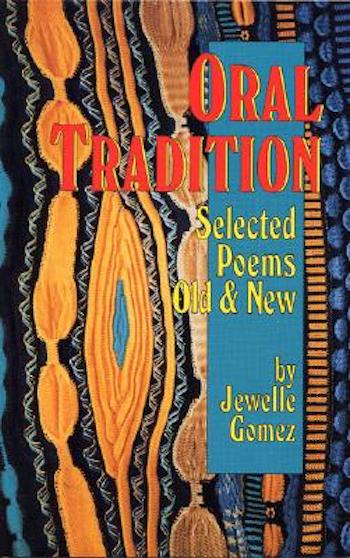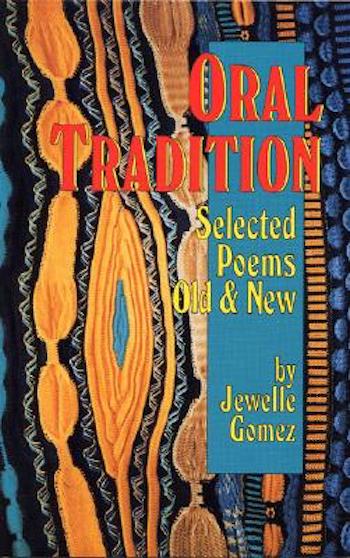The first book I featured in this column was The Gilda Stories, an awesome queer vampire collection by Jewelle Gomez, and now I’m returning to her work again with the first-ever poetry collection I’ve managed to locate for the QUILTBAG+ Speculative Classics column: Oral Tradition, published in 1995.
Queer speculative poetry only started to flower in the early 2010s with venues like Goblin Fruit, Stone Telling, Mythic Delirium and more; what we can find before that is sporadic at best. There is plenty of QUILTBAG+ poetry—of course! —and also speculative poetry, but intersection of the two is very limited, given the former unfriendliness of the speculative poetry landscape toward QUILTBAG+ themes. I think the first multi-author queer-themed project within a speculative venue was Bridging, the queer issue of Stone Telling edited by R.B. Lemberg and Shweta Narayan in 2012. Everything before that—and before 2010, my cutoff for QUILTBAG+ Speculative Classics—seems to have been published in non-SFF contexts, and is thus much harder for me to find.
Oral Tradition likewise was not released by an SFF press—it was published by Firebrand Books, a now sadly defunct queer press which often featured works by queer authors of color. I only managed to find this collection because I was already familiar with the author’s works and was able to seek them out—finding the book in the only slightly haunted Watson library on the University of Kansas campus. (Firebrand also published the original first edition of The Gilda Stories.)
Oral Tradition has a fascinating concept: its poems are framed by sections of Gilda singing. I’ve already written about the character of Gilda, the Black woman vampire living her quasi-eternal life through the ages, from the distant past to the future, and I mentioned that Gomez is still actively writing and publishing new Gilda stories. (The most recent one I’ve read appeared in the Black From the Future anthology edited by Stephanie Andrea Allan and Lauren Cherelle last year.) But I hadn’t been aware of the existence of Gilda poems! I knew some of the Gilda stories have been adapted to the stage in a full-length music/dance piece titled Bones and Ash: A Gilda Story, but I haven’t been able to get ahold of the play yet. In any case, Oral Tradition predates the play—as the back cover notes, “[Gomez] is currently adapting The Gilda Stories (her double Lambda Literary Award-winning Black lesbian vampire novel) as a performance piece.”
In Oral Tradition, Gilda sings about “Escape,” “Longevity,” “Desire” and “Dreaming Awake,” each song heading a section of poems—some new to the volume, some previously published. Many of the poems are not particularly speculative, but the concept that they are shared with the audience by an ages-old vampire gives them an SFnal twist. This provides a fascinating sense of scale to (now-past) contemporary pieces, too, and the thematic arc of the collection very explicitly plays with this:
The past will not lie down and die. It follows,
easy as a wind circling the coast,
then sits up still against plumped pillows,
waiting for my embrace,
hoping I will lay it open with a skillful blade,
let the guts of memory splash onto me
freeing blood for the stories of what really went before.
When I stole away, not to Jesus, I took the knife I needed
to do the cutting.The past is a place I visit on my way to the next
one hundred years.” (from “Gilda Sings: Escape”)
Gilda doesn’t pull her punches—the narrative self begins her tale with a depiction of slavery, then escape. But the ordering is conceptual, not chronological; the collection immediately follows with a then-contemporary poem of a queer roadtrip (“In New Mexico”), and then a piece about street harassment that a lesbian couple experiences (“You are not a man / and I am not white.” — “Beneath the Williamsburg Bridge”). It then goes on to a variety of locales, often together with the beloved. Are these travels, or are these all escapes?
We lick the center stripe
eating up the mountains, storm clouds, gorges,
carrying anxious headlines from the east
we’d rather forget. (“In New Mexico”)
In the second section, “Longevity,” Gilda reflects on her vampire body as seen by her lover’s gaze: “I am not sacred. The folds of my flesh are eternal / but ordinary except when under a gaze—hers, my own.” Gilda also quotes Audre Lorde: “We were never meant to survive.” Queer Black women survive, and together the stories and poems of Gilda reconceptualize the classic trope of the violent, evil vampire and present something infinitely more subtle and kind. Gilda, through Gomez—Gomez, through Gilda?—reflects on history from Hiroshima to the Middle Passage (“Hiroshima Red in Black and White; The Question”), eulogizing the victims of lynchings (“The Loss of Meaning”) and mourning the death of a bar singer and former sex worker (“Tanya Rienzi, 1939-1976”). All the pieces, many of which initially appeared in entirely different contexts, fit together in the eternal voice of Gilda. Gomez has a great sense for depth, even if we are taking the poems one by one (“On stage, under a glitter moon, / sequins were substance.” – Tanya Rienzi, 1939-1976”), and this adds a further layer to the collection.
Buy the Book


Oral Tradition: Selected Poems: Old and New
Gilda sounds the most contemporary when she sings about “Desire” in the following section. But a perspective of eternity is showing through: “I fear your newness, / my need to make you old.” (“At Night”) And the longer poem “Rooftop Sonata” quotes Anne Sexton in its epigraph: “A woman who loves women is forever young.” This is one of the longer pieces, focusing on queer Black women’s lives, both in hiding and also exposed, seen by straight people who comment; written in large measure in AAVE, unlike most of the other poems in the collection: “I seen that girl she call her niece. / Ain’t fooled me.” It’s at this point that the title, Oral Tradition, comes into greater focus, reflecting both on ancestral history passed on from generation to generation and serving as a sexual reference.
In the final section, “Dreaming Awake,” Gilda still carries her knife for gutting the past and exposing memories, but is questioning whether there still remains a need to do so: “There are many. Like me. Our knives remained sheathed. / Our eyes open.” She passes through the land, offering her gifts. There is also a sense of gender nonconformity and/or cross-dressing surfacing here (which also appears in the prose stories):
There’s a dream I have of who I am.
In it I’m a woman with my breasts bound tight
to my body–invincible. Armoured dreamer
with no obstacles in my path.A woman with my breasts bound tight to my body,
who can breathe only with care, wasting no air,
making no easy motion.I am not a woman ripe for splitting open
but a tightly wrapped package of everything we need to know.
Near the end of the collection, we find “The Purple Testament,” a hard-hitting poem in three parts about slavery and its aftershocks, colonialism and pushing against it, Blackness and Indigeneity, and remembrance. Touching the rock wall of a slave castle in Ghana, “A part of me slips in with them to harden the mortar, / leaving the rest of me free, afraid of the sun / that returns when the bulbs are lit.” (I wish I knew of this poem before I wrote my story “Unifications”—I would have wanted to cite it in some way.)
After this, we move on to a humorous poem about “Flamingoes and Bears” to ease the mood, and we end on a note of queer domesticity in “Keystone” that—in another meta-twist—discusses the author photo on the book’s back cover.
Oral Tradition takes us on a journey across time and space, and presents a fascinating entanglement of the speculative and non-speculative literary traditions. I hope to be seeing more and more of Gilda in the years to come, and I still have a considerable amount of backlog to get to, as well. I have a queer SFF anthology co-edited by Gomez in my to-read pile, so you’ll probably see that one in the column relatively soon. In the meanwhile, I’m still on the lookout for more (pre-2010) QUILTBAG+ speculative poetry—do any of you have possible leads?
Bogi Takács is a Hungarian Jewish agender trans person (e/em/eir/emself or singular they pronouns) currently living in the US with eir family and a congregation of books. Bogi writes, reviews and edits speculative fiction, and is a winner of the Lambda Literary Award and a finalist for the Hugo and Locus awards. You can find em at Bogi Reads the World, and on Twitter and Patreon as @bogiperson.










